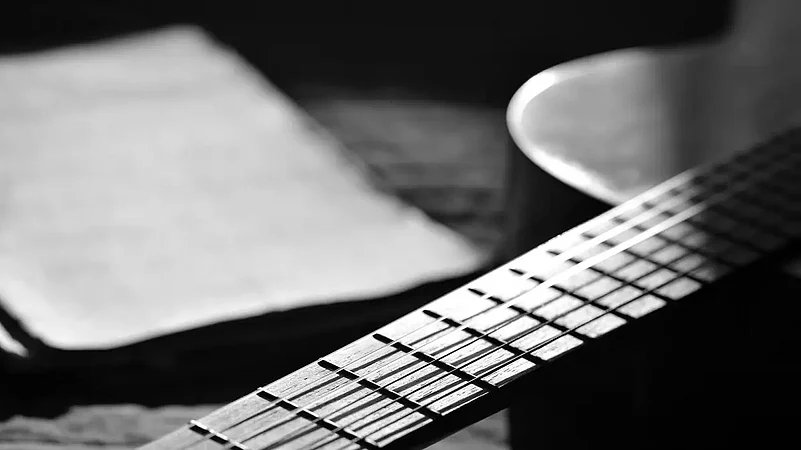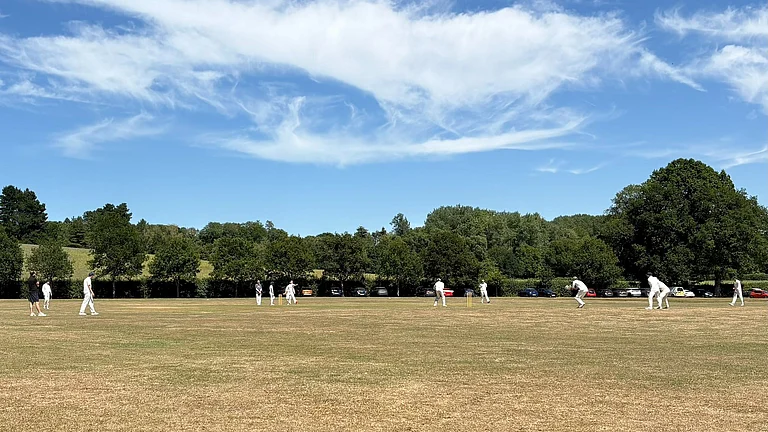Written spotlessly by Saurav Satyadarshi Ray and with foreword by Lucky Ali, this memoir is important because it does the rare work of exploring a writer’s personal galaxy and origins. It is important also because it gives a detailed behind-the-scenes thought process of all the songs that
the duo have collaborated on. Revealing never before seen secrets of simplicity and divinity that it takes to write and compose ageless content with an abiding universal resonance.
Aslam narrates that his father was the son of a maulvi and the youngest and naughtiest of his four siblings while they lived in their hometown in Kashmir. One day during a freak accident Aslam’s grandmother ended up damaging the right eye of Aslam’s father. Soon Aslam’s father lost both eyes in the face of poverty and became completely blind. First the mother and the next the father were shattered by this unbearable reality and both passed away in a span of six months. Like this, Aslam’s father was orphaned and blinded at 14 years of age and soon thrown out of all property by his brothers. This is when his father decided to come to Mumbai to make a living. Through sheer grit and hard work his father made a life for himself and married Aslam’s mother in Madras. Soon they came to Bangalore and continued to sell carpets and various other Kashmiri items.
Aslam was born in 1972, in a house that his father had made from mud and red soil. Aslam notes that this was the same year that ISRO was born resulting into the influx of the best of scientists into Bangalore. Aslam grew up to be a good student and a class topper. His father wanted him to
become an eye surgeon. At the same time Aslam’s father used to write poems and sonnets and this is where Aslam caught up with writing. Encouraged by his father and told by him that all religions are equal, Aslam narrates that he would take God’s name and start writing and the words would flow on their own. By the time he reached standard 8th, Aslam had won various writing competitions at school and state level.
It was after his 10th boards that Aslam saw Lucky Ali for the first time when visiting a local mosque. Soon his bond blossomed with Lucky who was 14 year older to him, as they started working together. Aslam narrates the process behind their first composition together. It was for Album Sunoh and the song was Raat Chandni (Tum hi Se). Fuelled by Aslam’s appreciation of the natural phenomena and the cosmos, this was essentially a song about Allah.
Soon enough Lucky sang a tune to Aslam and wanted him to write the lyrics for it. Aslam, who had always been a single person, positioned himself as a lover and wrote a love song on Lucky’s insistence. The first words that came from this insistence to think like a lover were - “Shaam Savere teri yaadien aati hain, Aake dil ko mere you tadpati hain, o sanam, mohabbat ki kasam” Aslam goes onto to enumerate the process behind each stanza of the super hit song O Sanam.
It was during this time that a difficult song came up. During the brainstorming, Aslam said to Lucky that if someone sticks to the path of truth and faith even after being insulted and humiliated, then they have already crossed the limits of virtuousness. Following this, Aslam wrote the line-
Ruswayi mein wafai kar ke kar lo intehayi ab. Soon the whole song came to him as narrated in detail in the memoir. This song is the ground-breaking Sunoh.
Aslam and Lucky would travel to various clients and clean their carpets to make money. On one occasion they ended up in a situation where a female client’s carpet worth a million rupees was soiled beyond repair after cleaning. This was due to the fault of the house helps. Yet Aslam and Lucky were screamed at a lot by the client who threatened them with a police complaint. They were really affected by this incident and it took a long time for the ordeal to end. This incident made Aslam write the song Zameen hain yahin aasman.
It was during a flight to Heathrow that Lucky said to Aslam that they have to write about the eternal journey that each person has to make to god. Pointing towards his wife (Masooma) and kids, Lucky added that he is doing everything for them and meeting so many people for their
sake. So Aslam wrote “Inke liye ab tak chale, hazaron se hum bhi mile” As they went on discussing, he got his lines. “Apne bhi dil mein basaye hue kuch irade hain, dil ke kisi kone bhi kuchh aise hi waade hain”. This song is the beautiful Dekha hai aise bhi. Written and completed sixty thousand feet in the air.
Aslam says that the first song of Sifar album, “Teri Yaadein Aati Hai”, actually happened much later after a senior official of Sony Music Company told them to add a cover track to the album. The song was written in a few hours.
Grippingly, when Lucky Ali had made the tune for „Kitni Haseen Zindagi Hai Yeh,‟ Aslam was going through depression. Aslam says that after four days of contemplation his hands automatically wrote the lines “Bahaaronn ke har sou rang hai bikhairaa rait ka sehra, ek pal ka
ghera, ek din bikharna yahan”.
During this phase of depression, Aslam and Lucky had a difference owing to Aslam’s state of mind. Then Lucky broke the ice by saying to Aslam - “We barely understand why things like this happen to us, you know. And this is what life is, we have to analyze, we have to think, we have
to feel, and we have to move. So Aslam wrote the opening lines “Tere mere saath jo hota hai Baat samajh mein aata nahin". Lucky cheered him further and told him that Aslam should bounce back as his heart is so good. So Aslam wrote “Dil walon ne, sahi maano dil diya hoga Dil walon ne, kuchh aisa hi kiya hoga”. Soon Aslam made up for their differences when he wrote, “Karta nahin main tujhse koi dillagi Acha hoon ya bura hoon main hoon yunhi sahi Pyaar tera jaana maine dil de diya Tujhse bichhad ke main jaaoonga kahan”. Tere Mere Saath is a timeless classic indeed.
Aslam soon wrote Gori Teri Aakhen Kahe. He recalls that during the recording, Lucky’s father Mehmood was also present as an exception. He repeatedly reprimanded Lucky for pronouncing Raat as Raath. Lucky finally got it right and remained angry and did not join the rest of the team for the photo session.
Saurav, the memoir writer says that it’s Aslam Noor who conceived the magical words from his imagination, musings, observation and experiences from life and then the legendary Lucky Ali refined the content, lent his voice and immortalized them.
Aslam recalls that once he took a train from Bangalore and met an army officer’s family—his wife, a son, and a daughter. The little girl’s name was Niharika. When the kids played antakshari they sang songs from Sunoh. The girl informed Aslam that there is an awesome new artist
called Lucky Ali and when departing she gave Aslam a Lucky Ali cassette as a memento. He still has it.
Similarly, while working with the top exec of an ad company Aslam was out of touch for three days because he did not have a phone number. When the exec met him next she gave him a phone and SIM card. Later she loved the jingle so much that she offered a new phone and SIM
for him to keep. But Aslam kept the one that she had given him.
Very reasonably priced, this memoir is a treasure house that every Lucky Ali fan must have. It has behind the scene of dozens of his songs including his collaboration with other producers.
In Aslam’s own words “Last but not the least, I thank all who have (or had) been a part of my
life’s journey. I might or might not have met them, but their very presence and essence have definitely impacted my life all the same. We all are connected to each other with a common string, which is love and higher consciousness. We can only feel it the moment we realize it.”
“Mitti ka bartan ho, bartan mein ho sona
Sone ke bartan mein mitti,
aisa nahin hona”
There should be an earthen pot with gold in it.
There shouldn‟t be a gold pot with mud in it.
(The author is a film writer based out of Mumbai)























